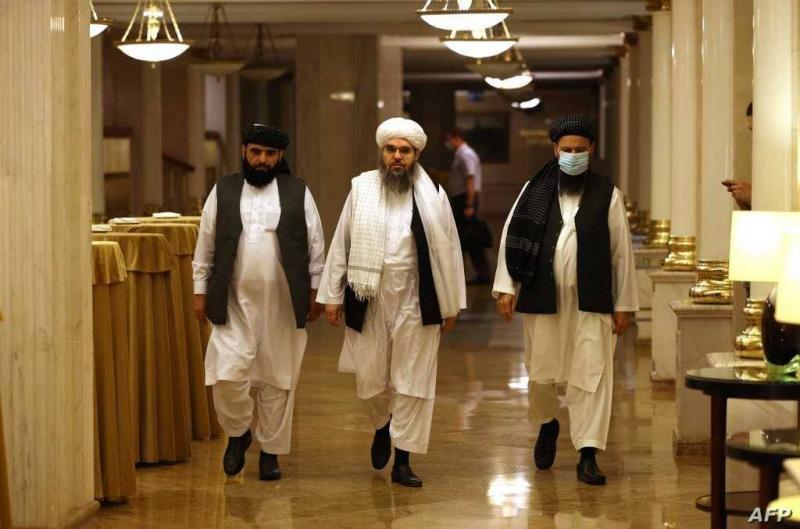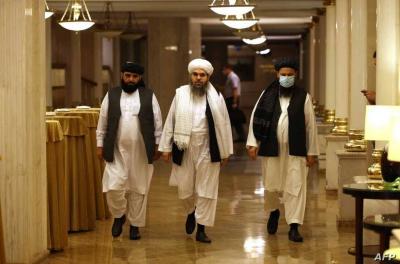The Afghan Taliban excluded the possibility of cooperating with the United States on containing extremist groups in Afghanistan, adopting a hardline stance on a key issue before the first direct talks between the former adversaries since the U.S. withdrawal from the country in August. Senior Taliban officials and U.S. representatives are scheduled to meet on Saturday and Sunday in the Qatari capital, Doha. Officials from both sides stated that the discussions would include curbing extremist armed groups, and the evacuation of foreign and Afghan citizens from the country. The Taliban showed flexibility regarding evacuation operations.
However, Taliban political spokesperson Suhail Shaheen told the Associated Press that there would be no cooperation with Washington in pursuing the ISIS branch in Afghanistan, which claimed responsibility for a number of attacks, including a suicide bombing on Friday that targeted a Shia mosque in the northeastern city of Kunduz. In response to a question about whether the Taliban would cooperate with the U.S. to contain the ISIS branch, Shaheen said, "We are capable of dealing with ISIS alone." ISIS has launched fierce attacks targeting Shia communities in the country since its emergence in eastern Afghanistan in 2014.
The weekend meetings in Doha are the first since the withdrawal of U.S. forces from Afghanistan at the end of August, marking the end of a 20-year military presence and the Taliban's rise to power in the country. Washington has confirmed that these meetings do not mean, nor are they a precursor to, recognizing Taliban rule.
These talks follow two days of "difficult discussions" between Pakistani officials and U.S. Deputy Secretary of State Wendy Sherman in Islamabad, which also focused on Afghanistan. Pakistani officials urged the United States to engage with the new Afghan rulers and to release billions of dollars of Afghanistan's frozen assets to avoid an economic collapse there. Pakistan also sent a message to the Taliban urging them to become more inclusive and to pay greater attention to human rights and the rights of ethnic and religious minorities.
Following the Friday attack, Shia clerics in Afghanistan criticized the Taliban rulers and called for greater protection of their places of worship. ISIS claimed responsibility for the attack, describing the bomber as a Uyghur Muslim. The claim stated that the attack targeted both Shia and the Taliban for their willingness to expel the Uyghurs in response to Chinese demands. This attack is the deadliest since the departure of U.S. and NATO forces from Afghanistan on August 30.
Michael Kugelman, Deputy Director of the Asia Program at the Wilson Center based in the U.S., stated that Friday's attack could herald further violence. Most Uyghur fighters belong to the East Turkestan Islamic Movement, which has found refuge in the border areas of Pakistan and Afghanistan for decades. He tweeted following the attack, "If ISIS's claim is accurate, China's concerns about terrorism in Afghanistan—which the Taliban claims to understand—will grow."
Meanwhile, the Taliban has begun relocating Afghans who fled from their rapid takeover of the country in August, and who had been living in tents in a park in Kabul, to their homes in the north of the country by bus, as threats from ISIS escalate following the Kunduz attack. Taliban official Mohammad Arsa Kharoti stated that up to 1.3 million Afghans have been displaced due to previous wars, and that the Taliban lacks the funds needed to organize everyone’s return home. He also noted that the Taliban has facilitated the return of 1,005 displaced families to their homes so far.
An American official remarked that U.S. officials would also seek to hold the Taliban accountable during the Doha talks for their commitment to allow Americans and other foreigners to leave Afghanistan, along with Afghans who worked with the U.S. military or government, and other Afghans. The official spoke on the condition of anonymity as they were not authorized to discuss the Doha meetings.




